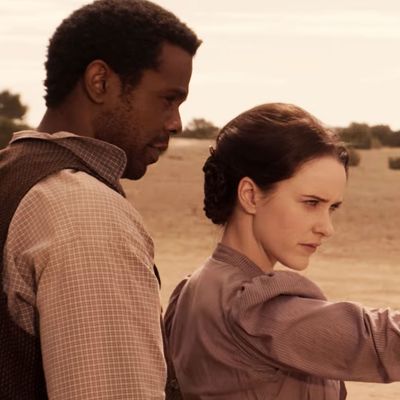
The great Walter Hill (48 Hrs., The Warriors, The Driver) likes to say that all his movies are, on some level, westerns. This is probably true. But whenever he’s officially tackled the genre, he’s always managed to do something different with it. The Long Riders (1980) is nothing like Geronimo: An American Legend (1993), which is nothing like Wild Bill (1995), which is nothing like Broken Trail (2006). And now, at age 80, he’s given us Dead for a Dollar, which is nothing like any of those films, for better and for worse.
Hill has always liked basic, elemental stories, but I’ve found his best work to have a textured, feverish, lived-in quality, which allows him to make myths concrete, touchable. (His 1984 rock thriller, Streets of Fire, might be the silliest of stories, but it’s clearly been made by people who fully believe in it — and whenever I watch that film, it comes spectacularly to life.) Dead for a Dollar begins in characteristically direct fashion. In a desolate New Mexico territorial prison, Max Borlund (Christoph Waltz), a legendary bounty hunter, visits Joe Cribbens (Willem Dafoe), a famed horse thief and bank robber he’d put away, who is due to be released in a week. Cribbens has vowed to kill Borlund, but the two men briefly reach a truce and agree never to confront each other. Then Max takes a job to go in search of Rachel Kidd (Rachel Brosnahan), the wife of a prominent local businessman (Hamish Linklater) who has supposedly been taken hostage by Elijah Jones (Brandon Scott), a Black deserter. Joining Max on the hunt is Sergeant Alonzo Poe (Warren Burke), a friend of Elijah’s who insists Rachel wasn’t abducted but has willingly run off with the soldier in order to get away from (and extort) her slimy, abusive, philandering husband.
It would be a predictable journey, but complicating matters is that everybody winds up headed to Chihuahua, Mexico, where local gangster-businessman Tiberio Vargas (Benjamin Bratt) reigns supreme, trading lives and services with the sociopathic indifference of a man for whom money and death exist on the same continuum. The title, Dead for a Dollar, isn’t just a fond allusion to Sergio Leone westerns; it’s the governing ethos of a film whose story soon turns almost entirely on an intricate series of exchanges — some financial, others moral. The year is 1897. The 20th century is around the corner, and Hill and co-writer Matt Harris look to be capturing the moment when the old world turned into the new and everything became business.
Speaking of transactions: Hill reportedly shot Dead for a Dollar for very little money on a very tight schedule, and it shows at times. Performances can be uneven. Waltz and Dafoe make even the most cumbersome dialogue sound like poetry, and Bratt has a snarling intensity that reminds us what a refreshing presence he can be onscreen. But Brosnahan’s delivery has a practiced quality — and not always in a way that reflects the character. The occasional sweeping desert vista notwithstanding, there’s an anti-septic, stagy quality to some scenes. That can be distracting, especially coming from a filmmaker who, at full strength, is such a master of environments.
But Hill turns these shortcomings into virtues. The picture’s surface austerity and simplicity have a crystallizing effect, drawing our attention to the coldhearted, transactional nature of this world. You can’t lose yourself in Dead for a Dollar, which might disappoint genre fans or those looking for Hill to recapture something like the snowballing, ritualistic violence of a classic like The Long Riders or the epic majesty of something like Geronimo. But the asceticism does him good and lends the film a mood that is both elegiac and embittered. The West of legend, it seems, has passed everyone in this movie by. All that remains is the dollar.
More Movie Reviews
- The Accountant 2 Can Not Be Taken Seriously
- Another Simple Favor Is So Fun, Until It Gets So Dumb
- Errol Morris Has Been Sucked Into the Gaping Maw of True Crime


